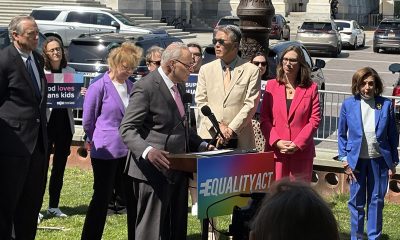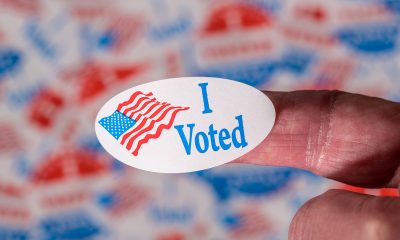Politics
Senate hearing set for gay judicial nominee
Oetken could become first openly gay male to sit on federal bench
A Senate hearing has been scheduled on Wednesday for a judicial nominee who, if confirmed, could become the first openly gay male to sit on the federal bench.
The Senate Judiciary Committee is set to considered the nomination of J. Paul Oetken, whom President Obama nominated in January to become a U.S. district judge for the Southern District of New York. The hearing is scheduled for 2:30 p.m. in Room 226 of the Dirksen Senate Office Building.
Sen. Chuck Schumer, who recommended the nomination of Oetken to the bench in September, is set to preside over the hearing. Obama officially nominated Oekten to the position based on Schumer’s recommendation.
According to Schumer’s office, Oetken has practiced law at Debevoise and Plimpton, and since 2004, has served as associate general counsel at Cablevision. From 1999 to 2001, Oetken was associate counsel to President Clinton and specialized in First Amendment issues, presidential appointments, ethics, civil rights, and legal policy.
Oetken also served in various roles as an LGBT advocate. The nominee has been involved with Lambda Legal and the American Civil Liberties Union. Additionally, Oetken co-authored a U.S. Supreme Court friend-of-the-court brief in Lawrence v. Texas, which struck down sodomy laws throughout the country.
Along with Oetken, the committee is slated to consider during the hearing three other nominations: Bernice Bouie Donald, who’s been nominated to become U.S. circuit judge for the Sixth Circuit; Paul Engelmayer, who’s also been nominated to become a U.S. district judge for the Southern District of New York; and Ramona Villagomez Manglona, who’s been nominated to become a judge for the district court for the Northern Mariana Islands.
Obama in January also nominated another openly gay man to the federal bench, Edward DuMont. The president tapped him to serve as an appellate judge and to sit on the U.S. Court of Appeals for the Federal Circuit.
Whether the Senate first grants Oetken or DuMont confirmation will determine who becomes the first openly gay male to serve on the federal bench. Should DuMont receive confirmation, he would also become the openly LGBT federal appellate judge.
The Senate is considering the nomination of Oetken after the White House rejected the nomination of Daniel Alter, another New York attorney and former director of civil rights for the Anti-Defamation League, for the same position.
In October, the Washington Blade reported that the White House rejected the Alter nomination, which was recommended by Schumer, based on comments he reportedly made challenging inclusion of the phrase “under God” in the Pledge of Allegiance and suggesting that merchants not wish shoppers “Merry Christmas” during the holidays. Alter has denied he made the reported comments.
While Oetken could be the first openly gay male to serve on the federal bench, he wouldn’t be the first openly LGBT person. In 1994, President Clinton nominated Deborah Batts, an out lesbian, to serve as federal judge also for the U.S. District Court of the Southern District of New York.
The San Francisco Chronicle reported last year Judge Vaughn Walker of the U.S. District Court for Northern District of California is gay, although Walker wouldn’t comment on the reporting. Walker presided over Perry v. Schwarzenegger, a federal case that will determine the constitutionality of Proposition 8 in California.
Congress
Congress passes ‘Big, Beautiful Bill’ with massive cuts to health insurance coverage
Roughly 1.8 million LGBTQ Americans rely on Medicaid

The “Big, Beautiful Bill” heads to President Donald Trump’s desk following the vote by the Republican majority in the U.S. House of Representatives Thursday, which saw two nays from GOP members and unified opposition from the entire Democratic caucus.
To partially offset the cost of tax breaks that disproportionately favor the wealthy, the bill contains massive cuts to Medicaid and social safety net programs like food assistance for the poor while adding a projected $3.3 billion to the deficit.
Policy wise, the signature legislation of Trump’s second term rolls back clean energy tax credits passed under the Biden-Harris administration while beefing up funding for defense and border security.
Roughly 13 percent of LGBTQ adults in the U.S., about 1.8 million people, rely on Medicaid as their primary health insurer, compared to seven percent of non-LGBTQ adults, according to the UCLA School of Law’s Williams Institute think tank on sexual orientation and gender identities.
In total, the Congressional Budget Office estimates the cuts will cause more than 10 million Americans to lose their coverage under Medicaid and anywhere from three to five million to lose their care under Affordable Care Act marketplace plans.
A number of Republicans in the House and Senate opposed the bill reasoning that they might face political consequences for taking away access to healthcare for, particularly, low-income Americans who rely on Medicaid. Poorer voters flocked to Trump in last year’s presidential election, exit polls show.
A provision that would have blocked the use of federal funds to reimburse medical care for transgender youth was blocked by the Senate Parliamentarian and ultimately struck from the legislation — reportedly after the first trans member of Congress, U.S. Rep. Sarah McBride (D-Del.) and the first lesbian U.S. senator, Tammy Baldwin (D-Wis.), shored up unified opposition to the proposal among Congressional Democrats.
Congress
Ritchie Torres says he is unlikely to run for NY governor
One poll showed gay Democratic congressman nearly tied with Kathy Hochul

Gay Democratic Congressman Ritchie Torres of New York is unlikely to challenge New York Gov. Kathy Hochul (D) in the state’s next gubernatorial race, he said during an appearance Wednesday on MSNBC’s “Morning Joe.”
“I’m unlikely to run for governor,” he said. ““I feel like the assault that we’ve seen on the social safety net in the Bronx is so unprecedented. It’s so overwhelming that I’m going to keep my focus on Washington, D.C.”
Torres and Hochul were nearly tied in a poll this spring of likely Democratic voters in New York City, fueling speculation that the congressman might run. A Siena College poll, however, found Hochul leading with a wider margin.
Back in D.C., the congressman and his colleagues are unified in their opposition to President Donald Trump’s signature legislation, the “Big Beautiful Bill,” which heads back to the House after passing the Senate by one vote this week.
To pay for tax cuts that disproportionately advantage the ultra-wealthy and large corporations, the president and Congressional Republicans have proposed massive cuts to Medicaid and other social programs.
A provision in the Senate version of the bill that would have blocked the use of federal funds to reimburse medical care for transgender youth was blocked by the Senate Parliamentarian and ultimately struck from the legislation, reportedly after pressure from transgender U.S. Rep. Sarah McBride (D-Del.) and lesbian U.S. Sen. Tammy Baldwin (D-Wis.).
Torres on “Morning Joe” said, “The so-called Big Beautiful Bill represents a betrayal of the working people of America and nowhere more so than in the Bronx,” adding, “It’s going to destabilize every health care provider, every hospital.”
Congress
House Democrats oppose Bessent’s removal of SOGI from discrimination complaint forms
Congressional Equality Caucus sharply criticized move

A letter issued last week by a group of House Democrats objects to Treasury Secretary Scott Bessent’s removal of sexual orientation and gender identity as bases for sex discrimination complaints in several Equal Employment Opportunity forms.
Bessent, who is gay, is the highest ranking openly LGBTQ official in American history and the second out Cabinet member next to Pete Buttigieg, who served as transportation secretary during the Biden-Harris administration.
The signatories to the letter include a few out members of Congress, Congressional Equality Caucus chair and co-chairs Mark Takano (Calif.), Ritchie Torres (N.Y.), and Becca Balint (Vt.), along with U.S. Reps. Nikema Williams (Ga.), Hank Johnson (Ga.), Raja Krishnamoorthi (Ill.), Delia Ramirez (Ill.), Joyce Beatty (Ohio), Lloyd Doggett (Texas), Eleanor Holmes Norton (D.C.), Josh Gottheimer (N.J.), and Sylvia Garcia (D-Texas).
The letter explains the “critical role” played by the EEO given the strictures and limits on how federal employees can find recourse for unlawful workplace discrimination — namely, without the ability to file complaints directly with the Employment Opportunity Commission or otherwise engage with the agency unless the complainant “appeal[s] an agency’s decision following the agency’s investigation or request[s] a hearing before an administrative judge.”
“Your attempt to remove ‘gender identity’ and ‘sexual orientation’ as bases for sex discrimination complaints in numerous Equal Employment Opportunity (EEO) forms will create unnecessary hurdles to employees filing EEO complaints and undermine enforcement of federal employee’s nondiscrimination protections,” the members wrote in their letter.
They further explain the legal basis behind LGBTQ inclusive nondiscrimination protections for federal employees in the EEOC’s decisions in Macy v. Holder (2012) and Baldwin v. Foxx (2015) and the U.S. Supreme Court’s decision in Bostock v. Clayton County (2020).
“It appears that these changes may be an attempt by the department to dissuade employees from reporting gender identity and sexual orientation discrimination,” the lawmakers wrote. “Without forms clearly enumerating gender identity and sexual orientation as forms of sex discrimination, the average employee who experiences these forms of discrimination may see these forms and not realize that the discrimination they experienced was unlawful and something that they can report and seek recourse for.”
“A more alarming view would be that the department no longer plans to fulfill its legal obligations to investigate complaints of gender identity and sexual orientation and ensure its
employees are working in an environment free from these forms of discrimination,” they added.
-

 U.S. Supreme Court3 days ago
U.S. Supreme Court3 days agoSupreme Court to consider bans on trans athletes in school sports
-

 Out & About3 days ago
Out & About3 days agoCelebrate the Fourth of July the gay way!
-

 Virginia3 days ago
Virginia3 days agoVa. court allows conversion therapy despite law banning it
-

 Federal Government5 days ago
Federal Government5 days agoUPenn erases Lia Thomas’s records as part of settlement with White House










